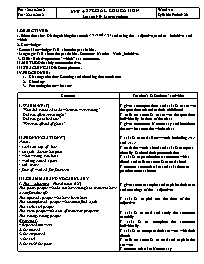Giáo án English 10 - Unit 4: Special Education - Lesson 5: E.Language Focus - Năm học 2012-2013

I. OBJECTIVES:
1. Education aim: Distinguishing the sounds / ᴐ / and / ᴐ: / and using the + adjective, used to + infinitive and which
2. Knowledge:
- General knowledge: Talk about the past habits.
- Language: Talk about the past habits. Structure: Used to + Verb _infinitive.
3. Skills: Relative pronoun “which” as a connector.
II. METHOD: Mainly communicative.
III. TEACHING AIDS: Some pictures.
IV. PROCEDURE:
1. Class organization: Greeting and checking the attendance
2. Check up:
3. Presenting the new lesson:
Bạn đang xem tài liệu "Giáo án English 10 - Unit 4: Special Education - Lesson 5: E.Language Focus - Năm học 2012-2013", để tải tài liệu gốc về máy bạn click vào nút DOWNLOAD ở trên
Pre : 20.10.2012 Tea: 22.10.2012 UNIT 4: SPECIAL EDUCATION Lesson 5: E/ Language focus Week: 10 Syllable Period: 26 I. OBJECTIVES: 1. Education aim: Distinguishing the sounds / ᴐ / and / ᴐ: / and using the + adjective, used to + infinitive and which 2. Knowledge: - General knowledge: Talk about the past habits. - Language: Talk about the past habits. Structure: Used to + Verb _infinitive. 3. Skills: Relative pronoun “which” as a connector. II. METHOD: Mainly communicative. III. TEACHING AIDS: Some pictures. IV. PROCEDURE: Class organization: Greeting and checking the attendance Check up: Presenting the new lesson: Contents Teacher’s & Students’ activities I. WARM-UP (5’) + What did you used to do when you were young? + Did you often cry at night? + Did you go to bed late? + Were you afraid of ghost? II. PRONUNCIATION (7’) Notes: - socks, on, top, of, box - lost, job, doctor, hospital - what, wrong, you, boss - walking, called, sport - talk, more - four, of, walked, for, fourteen III. GRAMMAR AND VOCABULARY 1. The + adjective = Plural noun (12’) The poor: people who do not have enough to money to have a comfortable life The injured : people who have been hurt The unemployed : people who cannot find a job The sick: sick people The rich: people with a lot of money or property The young: young people Exercise 1: * Expected Answers: 2. the inured 3. the employed 4. the sick 5. the rich/ the poor 2. Used to + infinitive (10’) + He used to cry for candies + He is used to living here * Expected Answers: Used to + bare-infinitive To be used to + gerund/ noun Exercise 2: * Expected Answers: 2. used to have 3. used to live 4. used to eat 5. used to be 6. used to take 7. used to be 8. Did you use to go 3. Relative pronoun “Which” : (7’) + She can’t speak English, which is a disadvantages + Sheila couldn’t come to the party, which was a pity Exercise 3: * Expected Answers: 1. e 2. c 3. f 4. g 5. a 6. d 7. b Homework ( 2’) T gives some questions and asks Ss to answer the questions related to their childhood T calls on some Ss to answer the questions individually in front of the class T gives comments if necessary and introduce the new lesson to the whole class T asks Ss to read all new words including / ᴐ / and / ᴐ: / T reads the words aloud and asks Ss to repeat chorally & check their pronunciation T asks Ss to practice these sentences with a friend and calls on some Ss to read aloud T corrects some mistakes and asks them to practice more at home T gives some examples and explains their uses and meanings of the + adjectives T asks Ss to pick out the form of the + adjective T asks Ss to read and study the sentences carefully T asks Ss to complete the sentences individually T asks Ss to compare their answers with their friends T calls on some Ss to read and explain the answers T corrects mistakes if necessary T asks Ss to review the uses of ‘used to + infinitive’ and give some examples T calls on some Ss to read and explain their examples T corrects mistakes if necessary T asks Ss to distinguish the differences between ‘used to’ and ‘to be used to’ through the following examples T explains the request of the exercise and asks Ss to do the exercise 2 individually T asks Ss to exchange their answers with a friend T calls on some Ss to read and explain their answers T corrects mistakes if necessary T gives some examples and asks Ss to give comments on the use of relative pronoun “Which” T explains the use of relative pronoun ‘Which’ and asks Ss to take notes T asks Ss to read all sentences in column A and in column B T asks Ss to sit in pairs and join a sentence from A with one from B to make new sentence using ‘Which’ T calls on some Ss to read and explain their answers T corrects mistakes if necessary T asks Ss to review all grammatical points and do exercises again T asks Ss to prepare the new lesson ----d◊c----
Tài liệu đính kèm:
 E.Languge focus.doc
E.Languge focus.doc





